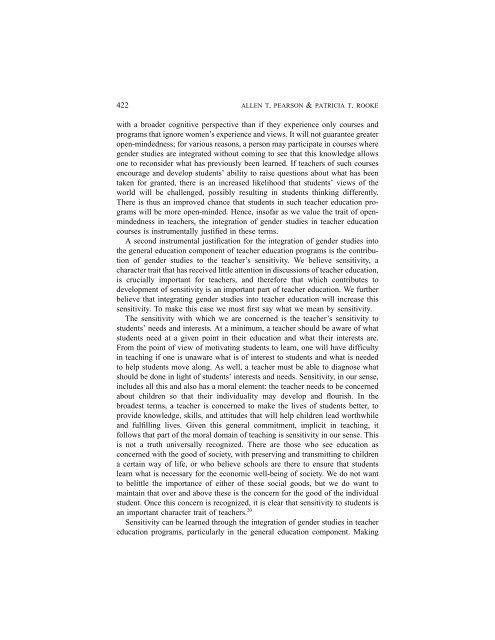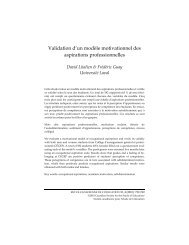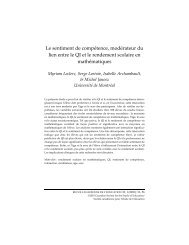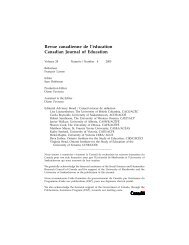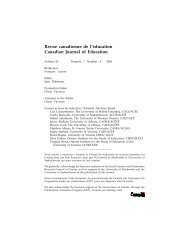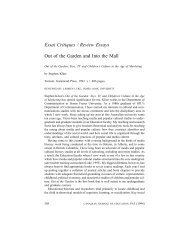Mireille Falardeau et Michel Loranger Le choix de stratégies ... - CSSE
Mireille Falardeau et Michel Loranger Le choix de stratégies ... - CSSE
Mireille Falardeau et Michel Loranger Le choix de stratégies ... - CSSE
Create successful ePaper yourself
Turn your PDF publications into a flip-book with our unique Google optimized e-Paper software.
422 ALLEN T. PEARSON & PATRICIA T. ROOKE<br />
with a broa<strong>de</strong>r cognitive perspective than if they experience only courses and<br />
programs that ignore women’s experience and views. It will not guarantee greater<br />
open-min<strong>de</strong>dness; for various reasons, a person may participate in courses where<br />
gen<strong>de</strong>r studies are integrated without coming to see that this knowledge allows<br />
one to reconsi<strong>de</strong>r what has previously been learned. If teachers of such courses<br />
encourage and <strong>de</strong>velop stu<strong>de</strong>nts’ ability to raise questions about what has been<br />
taken for granted, there is an increased likelihood that stu<strong>de</strong>nts’ views of the<br />
world will be challenged, possibly resulting in stu<strong>de</strong>nts thinking differently.<br />
There is thus an improved chance that stu<strong>de</strong>nts in such teacher education programs<br />
will be more open-min<strong>de</strong>d. Hence, insofar as we value the trait of openmin<strong>de</strong>dness<br />
in teachers, the integration of gen<strong>de</strong>r studies in teacher education<br />
courses is instrumentally justified in these terms.<br />
A second instrumental justification for the integration of gen<strong>de</strong>r studies into<br />
the general education component of teacher education programs is the contribution<br />
of gen<strong>de</strong>r studies to the teacher’s sensitivity. We believe sensitivity, a<br />
character trait that has received little attention in discussions of teacher education,<br />
is crucially important for teachers, and therefore that which contributes to<br />
<strong>de</strong>velopment of sensitivity is an important part of teacher education. We further<br />
believe that integrating gen<strong>de</strong>r studies into teacher education will increase this<br />
sensitivity. To make this case we must first say what we mean by sensitivity.<br />
The sensitivity with which we are concerned is the teacher’s sensitivity to<br />
stu<strong>de</strong>nts’ needs and interests. At a minimum, a teacher should be aware of what<br />
stu<strong>de</strong>nts need at a given point in their education and what their interests are.<br />
From the point of view of motivating stu<strong>de</strong>nts to learn, one will have difficulty<br />
in teaching if one is unaware what is of interest to stu<strong>de</strong>nts and what is nee<strong>de</strong>d<br />
to help stu<strong>de</strong>nts move along. As well, a teacher must be able to diagnose what<br />
should be done in light of stu<strong>de</strong>nts’ interests and needs. Sensitivity, in our sense,<br />
inclu<strong>de</strong>s all this and also has a moral element: the teacher needs to be concerned<br />
about children so that their individuality may <strong>de</strong>velop and flourish. In the<br />
broa<strong>de</strong>st terms, a teacher is concerned to make the lives of stu<strong>de</strong>nts b<strong>et</strong>ter, to<br />
provi<strong>de</strong> knowledge, skills, and attitu<strong>de</strong>s that will help children lead worthwhile<br />
and fulfilling lives. Given this general commitment, implicit in teaching, it<br />
follows that part of the moral domain of teaching is sensitivity in our sense. This<br />
is not a truth universally recognized. There are those who see education as<br />
concerned with the good of soci<strong>et</strong>y, with preserving and transmitting to children<br />
a certain way of life, or who believe schools are there to ensure that stu<strong>de</strong>nts<br />
learn what is necessary for the economic well-being of soci<strong>et</strong>y. We do not want<br />
to belittle the importance of either of these social goods, but we do want to<br />
maintain that over and above these is the concern for the good of the individual<br />
stu<strong>de</strong>nt. Once this concern is recognized, it is clear that sensitivity to stu<strong>de</strong>nts is<br />
an important character trait of teachers. 20<br />
Sensitivity can be learned through the integration of gen<strong>de</strong>r studies in teacher<br />
education programs, particularly in the general education component. Making


